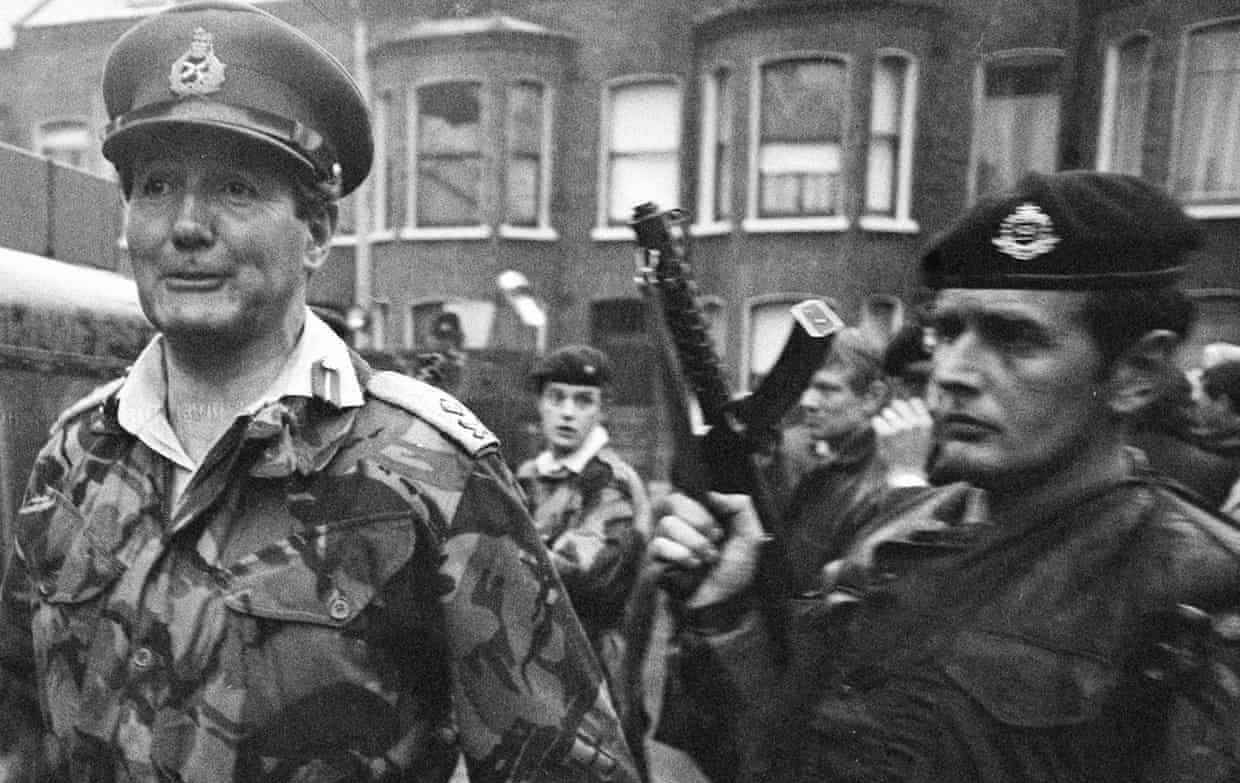
by Eamonn McCann (for the Guardian)
There may be only one thing that the Bloody Sunday families and the defenders of the Parachute Regiment are agreed on following the announcement that a former lance corporal is to be charged with two murders and four attempted murders: that it is perverse and unfair that one low-ranking soldier should be made to carry the can for what happened in Derry 47 years ago.
Once again, Kipling’s “poor bloody infantry” are to take the blame.
The man set for trial, Soldier F, didn’t erupt into the Bogside on his own initiative during the civil rights march of 30 January 1972. The plan for the day that ended with 13 dead civilians, had been drawn up by more prominent and powerful men.
Three weeks before Bloody Sunday Maj Gen Robert Ford, commander of land forces in Northern Ireland, wrote in a memo following a recce to Derry that he was “disturbed” by what he regarded as the soft attitude of local army and police chiefs to the Bogside, and added: “I am coming to the conclusion that the minimum force necessary to achieve a restoration of law and order is to shoot selected ringleaders amongst the DYH [Derry Young Hooligans].”
The Bogside had been barricaded against police and the army since the previous August, when internment without trial had been introduced. There were regular riots at the edge of the area. “Free Derry” had become an insult to all established norms of good order. The hooligans had taken over and would have to be put back in their place. Ford was going to sort them out.
On the day, although with no operational role, Ford travelled to Derry and took up position at the edge of the Bogside, shouting “Go on the paras!” as they charged through a barbed-wire barricade towards Rossville Street.
Six months earlier, the same unit had been involved in the killing of 11 unarmed civilians in Ballymurphy in west Belfast. There was no inquiry, apology, admission of guilt.
The “official” account of Bloody Sunday, which was to persist until publication of the Saville report in 2010, was based on a “shot-list” drawn up by Capt Michael Jackson, later Gen Sir Michael Jackson, chief of the general staff, Britain’s number one soldier. The list had apparently been compiled when soldiers, one by one, specified on a map where they had been when they opened fire, and where their target had been and what the target had been doing to justify the shooting.
But Jackson made no mention of it in his statement to Saville or in his oral evidence in April 2003. He was recalled to the stand in October after a document containing the shot-list in Jackson’s handwriting had fortuitously come to light. Asked to explain, he claimed that he had entirely forgotten the whole episode until later, when reports of the inquiry hearings had “stirred a vague memory”.
Answering detailed questions, he responded more than 20 times with phrases along the lines, “I don’t recall”, “I am sorry I cannot help you there”, and so forth.
The point is this - that if Saville had pointed a finger at Ford or Jackson, David Cameron would not have been able to say in the Commons that while the killings were “unjustified and unjustifiable”, no stain had been left on the honour of the British Army or the Parachute Regiment. It was all down to rogue soldiers, like Soldier F.
“I have never looked for vengeance,” said Kate Nash as the families splurged out from the Guildhall after hearing the news. Her brother had been killed and her father wounded. “But there’s still a feeling that the main people haven’t had to answer for anything.”
In this, too, Bloody Sunday was a very British atrocity.
![[Irish Republican News]](https://republican-news.org/graphics/title_gifs/rn.gif)
![[Irish Republican News]](https://republican-news.org/graphics/title_gifs/harp.gif)

